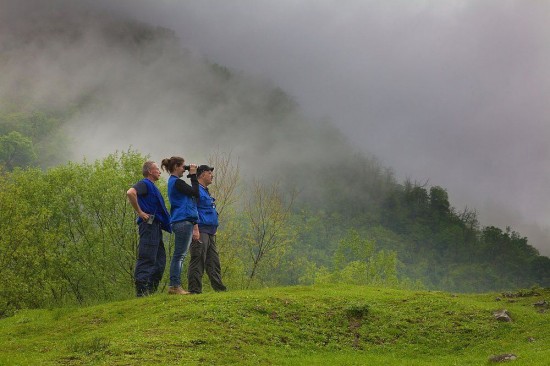
Russia Accelerates ‘Borderization’ in Georgia on War’s 20th Anniversary
Publication: Eurasia Daily Monitor Volume: 10 Issue: 175
By:

On September 30, Russian President Vladimir Putin sent a congratulatory message to Abkhazia’s authorities on the 20th anniversary of “the republic’s independence.” The anniversary marks the Abkhazian proclamation of independence in 1993, as Sukhumi fell to Russian military forces. “This holiday is a symbol of the Abkhaz people’s aspiration to build their own, sovereign state,” Putin wrote in his message (Interfax, September 30), without reference to the ethnic cleansing of Georgians, who formed a plurality of this territory’s population at that time.
Russia officially “recognized” Abkhazia’s and South Ossetia’s “independence” after the next war in 2008, but Putin is now casting the 1993 events as the founding act of Abkhazia’s “independence.” With this, Putin implicitly acknowledges the continuity of Russia’s policy design to break up Georgia. Deceptively claiming to observe Georgia’s territorial integrity and its internationally recognized borders until 2008, Russia in fact separated Abkhazia from the rest of Georgia by inserting a military demarcation line. That was the start of “borderization”—erecting borders between Russian-occupied territories and the rest of Georgia—a process that is currently reaching its final stage along the occupation line between South Ossetia and the rest of Georgia. Following a first round in June (see EDM, June 3, 11–13, 17), the second half of September has witnessed a further round of “borderization.”
The peculiarity of the current stage of “borderization” is a piecemeal advance of the occupation line more deeply inside Georgia (see EDM, September 23). This process involves biting off small chunks of Georgian terrain to enlarge the Russian-held territory, placing it nominally under South Ossetian administration. Russian border troops are installing barbed-wire fences and other obstacles, with or without forewarning from case to case. Even when forewarning is given, Georgian police on the ground and authorities in Tbilisi carefully refrain from taking any preventive measures (see below). The shift of the occupation line has already resulted in dividing villages or even farmsteads in some places. In other places the line is being moved over terrain from which Georgians were forcibly evicted in 2008 and their houses were destroyed afterward.
This process is described as “creeping” in a literal sense because it advances in small, slow, intermittent steps. Russia’s technique stops short of a massive provocation that might otherwise compel Georgia and the West to respond. Instead, the crawling approach makes it somewhat easier for the Georgian government (or at least parts of it) and its Western partners to remain passive, occasionally complaining pro forma without effect.
According to the United States embassy in Tbilisi, in a statement “authorized” by the State Department, “we continue to call for these barriers to be removed in accordance with Russia’s commitments under the August 2008 ceasefire agreement and its obligations under international humanitarian law.” The embassy has expressed deep concern over new dividing lines impeding local residents’ free access to farmsteads, schools or cemeteries (Civil Georgia, September 20). A visiting delegation of the European Union’s Political and Security Committee at the ambassadorial level has “expressed deep concern about the installation of fences and other obstacles,” reaffirming “strong support for Georgia’s territorial integrity and internationally recognized borders” (Civil Georgia, October 1). Verbal statements on the scene will remain ineffective unless Washington and Brussels raise this issue directly in Moscow, but Moscow seems confident that this will not happen.
The European Union’s Monitoring Mission (EUMM, comprised of 200 unarmed observers) is only able to watch and record the “borderization” process from the Georgian side of the occupation line, but is neither mandated nor equipped to take countermeasures. The two existing multilateral mechanisms—the Incident Prevention and Response Mechanism (IPRM) in Ergneti and International Discussions in Geneva—are deadlocked on this and other issues by the blocking powers of Russia, Sukhumi and Tskhinvali.
Russia’s Deputy Foreign Affairs Minister Grigory Karasin has twice phoned the EU’s Special Representative for the South Caucasus, French diplomat Philippe Lefort, warning Georgia and the EU against any “provocations and escalation” from the Georgian side. According to Moscow, any Georgian protests would only show that “Tbilisi is not ready to accept the irreversibility” of the situation on the ground (Civil Georgia, September 24, 27).
The Georgian government seems intimidated and confused by this situation. It has apparently bought into Moscow’s logic that Georgia would be blamed for “provocation and escalation” if it protested against the Russian moves. According to Prime Minister Bidzina Ivanishvili, his presidential candidate Giorgi Margvelashvili, Reintegration Minister Paata Zaakareishvili, and other officials, Georgia’s uppermost concern must be “not to yield to provocations” and “not escalate the situation.” Their statements imply that Tbilisi has no options other than acquiescing de facto. They also tend to default on the proposition that “[President Mikheil] Saakashvili” is responsible (Civil Georgia, September 25, 28, 30; Versia, September 30). Exceptionally, Georgia’s Ministry of Foreign Affairs has issued two statements condemning the “illegal actions of Russian occupying forces across the occupation line” (Civil Georgia, September 24).
According to Ivanishvili, Russia is undertaking the “borderization” as part of measures to guarantee the security of the Winter Olympic Games, due to be held in February 2014 in Sochi; and Georgia must do its best to cooperate in this. Ivanishvili coyly attributes this theory (“perhaps I should not say this publicly”) to Western diplomats. Ivanishvili’s special envoy for relations with Russia, Zurab Abashidze, agreed with that theory when questioned during parliamentary hearings (Civil Georgia, September 25, 27, 30). This does not seem to make any sense geographically or in other ways.
On the whole, the government (with one exception—see above) seems to have given up on appealing for international support. President Saakashvili did so in his September 24 valedictory address to the United Nations General Assembly. But the government acts as if it is facing Russia one-on-one, in an international vacuum. This perception may turn into a self-fulfilling prophecy, if the government passively accepts Russia’s territorial encroachments. It is a potentially dangerous line to follow as it may invite further “provocation and escalation” by Russia or through South Ossetian proxies, at any point along the yet-undemarcated occupation line.




